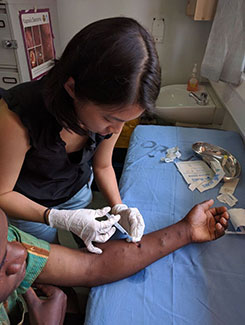Profile: First Fogarty dermatology Fellow Dr Aileen Chang studies Kaposi’s sarcoma in Uganda
July / August 2018 | Volume 17, Number 4

Photo courtesy of Dr. Aileen Chang
By Karin Zeitvogel
Dr. Aileen Chang broke the mold when she chose to investigate Kaposi’s sarcoma (KS) in Uganda as a
Fogarty Global Health Research Fellow. Although numerous skin conditions - albinism, autoimmune skin conditions, eczema and scabies, to name a few - affect people in low- and middle-income countries (LMICs), Chang was the first dermatologist to be awarded a Fogarty fellowship. “Dermatology is hugely relevant in LMICs, but completely under-represented,” noted Chang. “Fogarty can help to change that.”
Chang chose to study KS during her fellowship year, in part because research and care programs for the condition were already in place in East Africa. “It takes time to build the partnerships and relationships, the infrastructure and equipment that allow a researcher to come in and get data they can act on,” she said. “A year isn’t a long time, so I wanted to study something for which there was already momentum.”
Specifically, she focused on the biology of KS and the tissue micro-environment of patients’ skin lesions. Researchers at the University of California, San Francisco (UCSF) - the U.S. university partner on Chang’s Fogarty fellowship - had hypothesized that KS patients might respond to a treatment developed for metastatic melanoma sufferers that boosts the body’s immune response against cancer cells by inhibiting a protein called PD-1. “Maybe looking at the PD-1 pathway in KS will provide us with more understanding about the biology and immunology of KS and, down the road, lead to a therapy that would be useful,” Chang said.
Spending 2016-17 as a Fogarty Fellow at Makerere University’s Infectious Diseases Institute in Kampala was “career-affirming,” Chang said. In addition to doing important research, she met other Fellows and researchers, and learned to recognize and resolve issues that may seem inconsequential to people in the developed world, but can prevent people in LMICs from getting care.
For example, in Uganda, the cost of traveling to and from a clinic - often the only place where care is dispensed - deters some people from seeking medical attention. During her fellowship year, Chang investigated using locally made compression wraps for KS-related lymphoedema, reasoning that if wraps were available in a community instead of in clinics only, KS patients could use them at home. “Eliminating the barrier of transportation costs could be a simple way to improve care,” Chang said.
Being in Uganda also gave Chang unexpected research opportunities that she would never have had in the U.S. One arose when American and Ugandan scientists teamed up to study rheumatic heart disease in the East African country. Traditionally, rheumatic heart disease is thought to be caused by streptococcal pharyngitis - commonly called strep throat - which can lead to episodes of acute rheumatic fever, which, in turn, can cause rheumatic heart disease. But there are parts of the world where strep throat is not very common, but streptococcal skin infection is - and often found in association with scabies. Scientists know that superinfected scabies sores can lead to severe illnesses including septicemia, glomerulonephritis - and, potentially, rheumatic heart disease. “So these American and Ugandan investigators had me come along on this incredible experience where we screened thousands of children for streptococcal infection,” Chang recalled. “While most of the researchers were looking at the throat, I was looking at the skin. This opportunity was nowhere on my radar, but, because I was in Uganda, I got to do it.”
Now an assistant clinical professor of dermatology at UCSF, Chang continues to work on projects that link global health and dermatology. “Being a Fogarty Fellow opened my eyes wide to the relevance of dermatology in global health,” she said. “Fogarty allowed me to build partnerships and relationships, and create something sustainable that continues to have an impact, even after my fellowship ended.”
More Information
To view Adobe PDF files,
download current, free accessible plug-ins from Adobe's website.